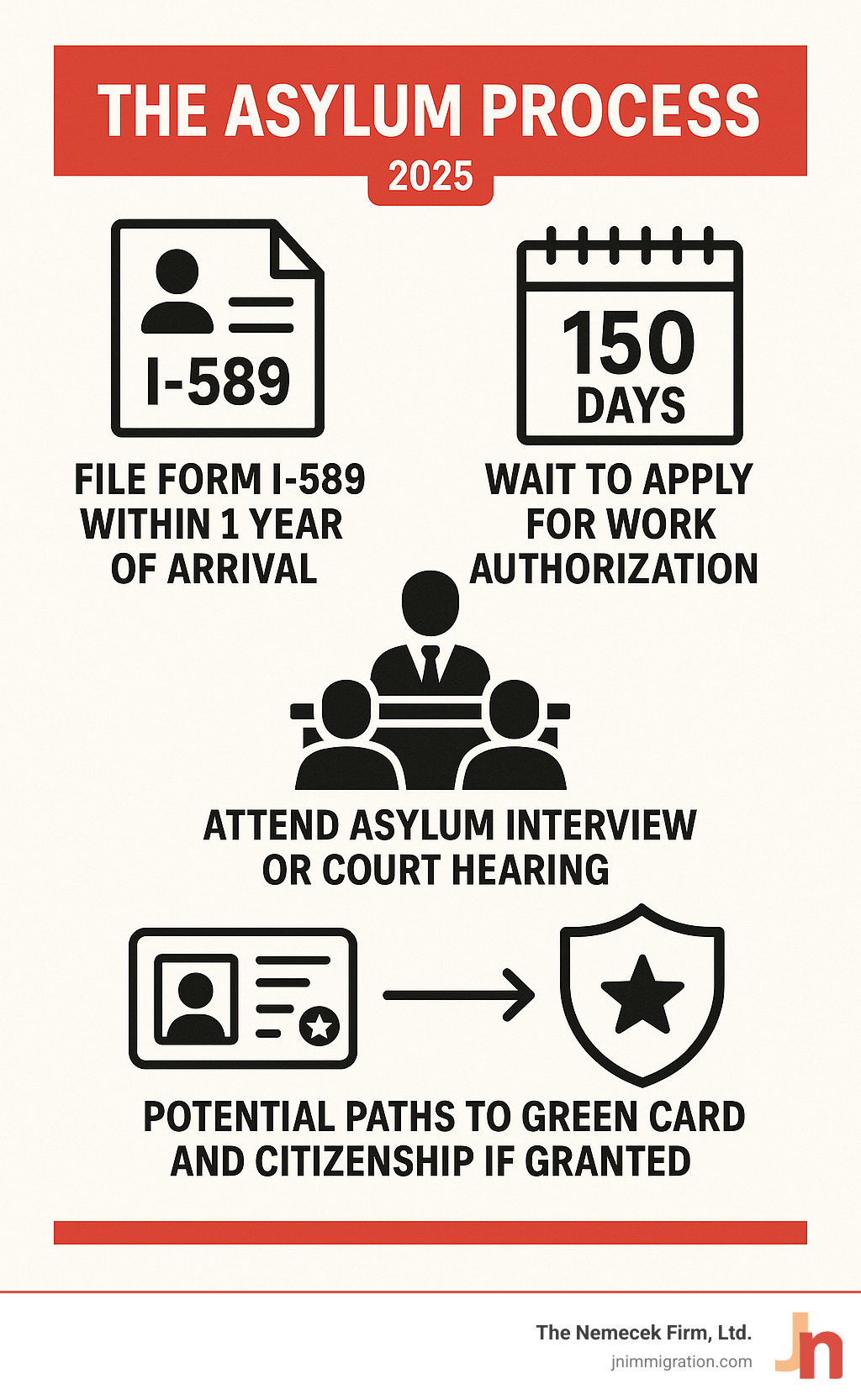
A political asylum attorney specializes in helping individuals who face persecution in their home countries seek protection in the United States. These legal professionals guide clients through the complex asylum process, from filing applications to representing them in immigration court.
Key services a political asylum attorney provides:
The stakes couldn’t be higher when seeking asylum. Research shows that asylum seekers with attorney representation are six times more likely to succeed than those who represent themselves. As one experienced asylum officer turned attorney noted, “leveraging government experience can help clients present stronger asylum cases.”
The asylum process is unforgiving. You must typically file within one year of arrival, meet strict legal standards, and steer complex federal immigration law. A single mistake can result in denial and potential deportation to the very country you fled.
For LGBTQ+ individuals, the challenges are even greater. You must prove that your sexual orientation or gender identity makes you a member of a “particular social group” that faces persecution. This requires deep understanding of both immigration law and evolving legal precedents around LGBTQ+ rights.
Whether you’re facing an affirmative asylum interview with USCIS or defending your case in removal proceedings, the right legal representation can mean the difference between safety and deportation.

When life in your home country becomes unbearable, asylum offers a legal pathway to safety in the United States. This protection can be a lifeline for those facing persecution.
Political asylum is protection for people already in the U.S. who face persecution back home. This requires a well-founded fear of persecution, meaning you have credible reasons to fear for your safety. The law recognizes five specific protected grounds: your race, religion, nationality, political opinion, or membership in a particular social group. This last category covers many situations where people face harm for characteristics they cannot change.
For example, being targeted for your sexual orientation or gender identity may qualify you under the “particular social group” category. These cases require careful legal analysis, and we offer specialized expertise in LGBT Asylum Lawyer services.
The persecution must come from your government or groups your government can’t or won’t control, such as police, military forces, or criminal organizations.
Crucially, you must typically file your asylum application within one year of your last arrival in the U.S. This deadline is strict, but important exceptions exist for changed country conditions or extraordinary circumstances like serious illness that prevented a timely filing.
Winning your asylum case provides protection from deportation, so you won’t be forced back to the country you fled. You can also apply for an Employment Authorization Document (EAD) to work legally and obtain a Social Security card.

After one year as an asylee, you become eligible for a Green Card (permanent residency), putting you on the pathway to U.S. citizenship. After five years total from your asylum grant, you can apply for citizenship. An annual cap on Green Cards for asylees may affect processing times but not your eligibility to apply for asylum.
Asylum also provides derivative asylum for family. Your spouse and unmarried children under 21 can be included in your application or join you later.
To qualify, you must be physically present in the United States, regardless of how you arrived, and demonstrate a well-founded fear of persecution. Even a 10% chance of persecution can be enough to meet this standard.
However, certain factors can disqualify you. You are generally barred from asylum if you have engaged in the past persecution of others or have been convicted of a particularly serious crime, which includes aggravated felonies. Posing a danger to U.S. security is another bar.
Firm resettlement in another country before coming to the U.S. can also disqualify your claim. If you were offered and accepted permanent status in another country, you may be ineligible for U.S. asylum. Finally, changed country conditions can either create new grounds for asylum or eliminate the persecution you originally feared.
These complex rules are why getting early Immigration Legal Advice is vital. A political asylum attorney can identify potential issues and help build the strongest possible case from the start.
The path to asylum protection depends on your circumstances. Understanding the two main routes—affirmative and defensive—and their timelines can help you prepare for what lies ahead.
The path you take depends on whether you are already in deportation proceedings.
Affirmative asylum is for those not in removal proceedings. You apply directly to U.S. Citizenship and Immigration Services (USCIS) by filing Form I-589. After background checks, you have an interview with an asylum officer. The process is less adversarial than a court hearing. If approved, you receive asylum. If denied and you have no other legal status, your case is referred to an immigration judge, which begins the defensive process.
Defensive asylum is for those already in removal proceedings before an immigration judge at the Executive Office of Immigration Review (EOIR). This occurs if you were apprehended at the border, entered without inspection, or overstayed a visa. You present your asylum claim as a defense against deportation in a formal courtroom setting. The judge decides whether to grant asylum or order removal.
| Feature | Affirmative Asylum (USCIS) | Defensive Asylum (EOIR) |
|---|---|---|
| Applicant Status | Not in removal proceedings | In removal proceedings (deportation) |
| Filing Location | USCIS Service Center | Immigration Court (before an Immigration Judge) |
| Interviewer/Hearer | Asylum Officer | Immigration Judge |
| Process Type | Generally non-adversarial (interview-based) | Adversarial (court hearings, testimony, cross-examination) |
| Outcome if Denied | Case referred to Immigration Court (if no other legal status) | Order of Removal (deportation), unless other relief granted |
Both paths start with Form I-589. A skilled political asylum attorney can ensure your application is accurate and complete, forming a strong foundation for your case.
The asylum process is very slow, with application backlogs in both USCIS and immigration courts. Decisions can take months or even years. This waiting time can be used to strengthen your case with your attorney.
For affirmative applications, the asylum interview is a critical moment. You must clearly explain your fear of returning home, and consistent testimony is vital.
If you arrived at a port of entry and expressed fear, you will first face a credible fear screening. An asylum officer determines if your fear is credible enough for a full hearing. A negative finding can be reviewed by an immigration judge.

While waiting for a decision, you can apply for a work permit. The 180-day clock for work permits starts once your application is filed. After 150 days, you can apply for an Employment Authorization Document (EAD), and USCIS can approve it once 180 days have passed. This work permit provides a lifeline, allowing you to support yourself while your case is pending.
A denial is not necessarily the end. If USCIS denies an affirmative application, you may receive a Notice to Appear (NTA), which begins removal proceedings but offers a second chance to present your case defensively before a judge.
An immigration judge’s denial can be appealed to the Board of Immigration Appeals (BIA). Further appeals may be possible in federal circuit courts.
Even if asylum is unavailable, other protections exist:
These alternatives have a higher standard of proof. A knowledgeable political asylum attorney can evaluate all options, as some bars to asylum may not apply to these other protections.
Fleeing persecution is overwhelming. The asylum process has complex legal requirements, strict deadlines, and life-changing consequences. This is why having a skilled political asylum attorney by your side isn’t just helpful—it’s essential for your success and safety.
Your political asylum attorney is your advocate, strategist, and guide through this challenging journey.
This comprehensive approach is part of our commitment to providing thorough Immigration Legal Counsel that protects your future.
The numbers don’t lie: asylum seekers with attorney representation are six times more likely to succeed than those who go it alone. This difference reflects the profound impact of skilled legal guidance.
Avoiding critical errors is a primary benefit. Mistakes on the lengthy Form I-589 can lead to denial. An experienced attorney ensures your case is built on a solid foundation.
Our former asylum officer insights provide a unique advantage. Understanding the government’s review process helps us present your case compellingly, addressing potential red flags before they become problems.

Presenting the strongest possible case means articulating your experiences to align with legal definitions and gathering corroborating evidence, from personal statements to expert testimony. Without representation, genuine asylum seekers can struggle with legal complexities. The right attorney is a dedicated advocate who understands the law and the human stakes.
Choosing your political asylum attorney is a critical decision. The right lawyer can mean the difference between safety and deportation.
At The Nemecek Firm, we’re proud to offer high-quality, affordable representation backed by specialized expertise in areas like LGBT immigration. Our goal is to provide the compassionate, knowledgeable support you need to succeed.
The asylum process can feel overwhelming, especially when you’re already dealing with the stress of fleeing persecution. We hear the same concerns from clients again and again, so let’s address the questions that keep people up at night.
This is one of the most anxiety-provoking questions we encounter, and understandably so. A criminal history can create significant problems, but it doesn’t always mean the end of your asylum hopes.
“Particularly serious crimes” and “aggravated felonies” can make you completely ineligible for asylum. But here’s the tricky part – what counts as a “particularly serious crime” isn’t always clear-cut. Immigration judges look at each case individually, considering factors like the nature of your conviction, how long you were sentenced, and whether you might pose a danger to the community.
Aggravated felonies are a specific category defined in immigration law, and they carry harsh consequences. These automatically bar you from asylum and other forms of relief. The frustrating reality is that some crimes labeled as “aggravated felonies” in immigration law might not seem particularly serious in everyday terms.
Even crimes that don’t automatically disqualify you can still hurt your case. Think of it this way – you’re asking the U.S. to protect you, so any criminal history makes that request more complicated.
Here’s where having a political asylum attorney becomes crucial. We can examine your specific criminal record, explain exactly how it might affect your case, and explore alternatives like Withholding of Removal or Convention Against Torture protection if traditional asylum isn’t possible.
The waiting game for work authorization is stressful, but there’s a clear timeline once you understand the rules. You can apply for your Employment Authorization Document (EAD) – your work permit – 150 days after filing your complete Form I-589 asylum application.
But here’s the catch: USCIS can only actually grant you that work permit once your application has been pending for a full 180 days without an initial decision. This 180-day period is what we call the “asylum clock.”
The good news? This means even while your asylum case is still pending (which can take months or even years), you can get legal authorization to work in the U.S. This provides crucial financial stability while you wait for your final decision.
Not qualifying for asylum doesn’t mean you’re out of options. The U.S. immigration system recognizes that people can still face serious harm even if they don’t meet asylum’s specific requirements.
Withholding of Removal is often the first alternative we explore. It prevents deportation to a country where you’d face persecution based on the same five grounds as asylum – race, religion, nationality, political opinion, or membership in a particular social group. The major difference is the burden of proof. Instead of showing a “well-founded fear” (which can be as low as a 10% chance), you must prove it’s “more likely than not” – meaning at least a 51% chance – that you’ll face persecution.
The downside? Withholding of Removal doesn’t lead to a Green Card or citizenship, and you can’t petition to bring family members to join you. But it does keep you safe from deportation.
Protection under the Convention Against Torture (CAT) is another crucial option. Here, you need to show it’s “more likely than not” that you’d be tortured if sent back to your country. The torture must involve government officials or happen with their knowledge and consent. Unlike asylum, the reason for the torture doesn’t have to fit into those five protected categories.
Both alternatives require that higher “more likely than not” standard of proof, which makes them more challenging to win. But for people facing severe risks who can’t get asylum – perhaps due to criminal history or other bars – these protections can literally be lifesavers.
The key is working with an experienced attorney who can evaluate all your options and help you understand which path offers the best chance of keeping you safe in the United States.
The path to asylum in the United States is rarely easy, but for those fleeing persecution, it represents hope—a chance to rebuild your life in safety. Throughout this journey, you’ve learned about the complex legal requirements, strict deadlines, and the many challenges that lie ahead. But here’s what matters most: you don’t have to face this alone.
Every asylum case tells a unique story of courage and survival. Whether you’re seeking protection based on your political beliefs, religious faith, sexual orientation, or membership in a persecuted group, your story deserves to be heard and understood. The difference between success and failure often comes down to having the right legal advocate by your side.
The statistics are clear and compelling. Asylum seekers with attorney representation are six times more likely to succeed than those who go it alone. This isn’t just about paperwork—it’s about having someone who understands the intricate legal landscape, knows how to present your case effectively, and can guide you through every step of the process.
At The Nemecek Firm, Ltd., we understand that seeking asylum is about more than just legal status. It’s about securing your future and protecting your family. Our Columbus, Ohio-based team offers specialized, affordable representation that extends across the United States and beyond. We’ve built our reputation on providing high-quality legal services while maintaining the personal touch that makes all the difference during such a challenging time.
What sets us apart is our deep understanding of the asylum process and our commitment to each client’s unique circumstances. Whether you’re navigating the complexities of LGBTQ+ asylum claims, facing challenges due to past criminal history, or simply need someone to help you tell your story effectively, we’re here to help. Attorney Nemecek’s media recognition and our specialized expertise mean you’re working with a team that truly understands immigration law.
The asylum process doesn’t have to be a journey you take alone. From the initial filing of your Form I-589 to preparing for your asylum interview or defending your case in immigration court, we provide comprehensive support every step of the way. We know that behind every case is a real person with real fears, real hopes, and a real need for safety.
Your future is worth fighting for. If you’re ready to take the next step in securing asylum protection, we invite you to explore our comprehensive Asylum and Refugee Services. Together, we can work toward the safety and security you deserve in the United States.